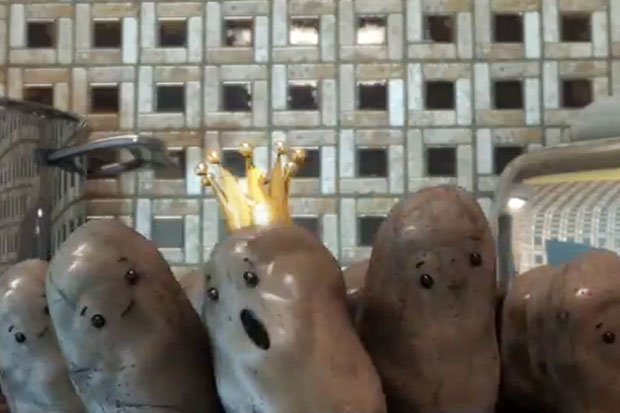Be careful what you wish for, keepers of the old-school flame.
Diplo, A-Trak, and Skrillex’s new YouTube channel, POTATO, launched yesterday, but instead of anything you might have been expecting from its debut episode — a roundup of twerking public servants, say, or animated tubers doing Baauer’s “Harlem Shake,” or a roundtable discussion on the three DJs’ preferred frequent-flyer programs — viewers were treated to a history lesson about the roots of techno. Or maybe it was a travelogue on Detroit? Actually, what the hell was that?
In an eight-minute clip that feels twice as long, we first learn, via Professor Skrillex, that “Detroit is the birthplace of electronic music, electronic dance music, whatever you want to call it, techno, whatever. Like, America really created a buzz, a scene, a vibe, you know?”
Then Boys Noize, Skrilly’s partner in the duo Dog Blood, clarifies that techno is actually more like punk rock: “For me, techno is way more than just a music style. Techno for me is a way of living, it’s an attitude, you know? You know, when techno started, it was a small room like this, and you put 200 people together, and you listen to music no one else would listen to, just because it’s something you feel and it’s different, and you don’t give a fuck about what other people say.”
Lord knows why it falls to Skrillex and Boys Noize to educate us about the roots of dance music; presumably, it has something to do with the fact that they played Detroit on New Year’s Eve, they had a camera crew along for the ride, and they felt like they needed to pay their respects. To that end, we get a kitschy fragment of a 1950s documentary touting Motor City as the metropolis of the future, followed by the obligatory B-roll of shuttered factories and gutted neighborhoods, accompanied by a 1986 cut from Juan Atkins and Kevin Saunderson in their Kreem guise.
The centerpiece of the whole video is an (actually really interesting) interview with the soft-spoken Saunderson, who talks about techno’s origins as an almost exclusively black music, versus what it’s become today. “Now, when I look at it, urban black kids don’t listen to techno,” he notes. “I could never have imagined in a thousand, million years that it’s gone like this. But people were inspired. Technology has progressed and moved forward. It’s great to see that the whole world knows techno. No matter what. They know it, it’s played, we play all around the world as DJs, go out there as producers, and I’m the beginning of all that.” Maybe it’s just the somber lighting, but there’s something melancholic, or at least resigned, in the way he sizes up techno’s current status — particularly given how his interview is cross-cut with images of amped-up white teenagers waving glow sticks and throwing devil horns at some ginormous stadium rave.
We get more bittersweet nostalgia from Sam Fotias, of Detroit promoters Paxahau and the Movement festival, who reminisces about parties he threw at the abandoned Packard Plant back in the ’90s. “It was a great time,” he recalls. “Through the natural evolution of things, the scene grew, and it gained attention, and then the police started paying attention, and ultimately, because of that, the scene kind of got beat back into the nightclubs and things like that. That era just doesn’t exist anymore.”
Then, bizarrely, the clip shifts to Skrillex and Boys Noize’s Dog Blood project. Boys Noize explains how techno’s “punk-rock vibe” influences him and Sonny. Skrillex demurs, “We’re, like, not even trying to make a big deal about it. We’re just having fun making music together, and people like it, so we’re just playing some shows.” The video closes out with footage of the two musicians playing together at a crowded party where a forest of cell phones grazes the room’s low ceiling, punctuated by twirling images of downtown Detroit and still more abandoned buildings.
So what’s the takeaway? All’s well that ends well? History favors the winners? The past is doomed to repeat itself — first as tragedy, then as farce, and finally as CGI spuds dancing to disco? That a sane person should never, ever read comments on YouTube?
Before its launch, a press release for the channel promised, “You’ll never look at music the same way again” (a phrase you oldsters might remember as MTV’s original slogan). And maybe that’s true, at least if you look at music’s subcultural history as anything more than a set of platitudes, rehashed clichés, missed opportunities (that Saunderson interview could have been great!), and unrelated phenomena. But hey: You say “potato,” I say “leveraging youth culture for optimized brand synergy.”





